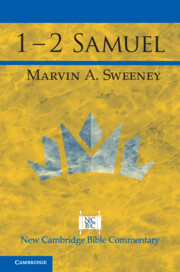Book contents
- 1–2 Samuel
- New Cambridge Bible Commentary
- 1–2 Samuel
- Copyright page
- Dedication
- Contents
- Supplementary Sections
- Preface
- A Word about the Names of G-d
- Abbreviations
- 1 Introduction
- 2 Suggested Readings on Samuel
- 3 Commentary Part I: The Rule of the House of Eli – 1 Samuel 1–7
- 4 Commentary Part II: The Rule of King Saul ben Kish of Israel – 1 Samuel 13–31
- 5 Commentary Part III: David’s Rise to Power as King of Judah and Israel – 2 Samuel 1:1–5:3
- 6 Commentary Part IV: The Regnal Account of King David ben Jesse over Israel – 2 Samuel 5:1–24:25/1 Kings 2:11
- Author Index
- Subject Index
- References
2 - Suggested Readings on Samuel
Published online by Cambridge University Press: 14 December 2023
- 1–2 Samuel
- New Cambridge Bible Commentary
- 1–2 Samuel
- Copyright page
- Dedication
- Contents
- Supplementary Sections
- Preface
- A Word about the Names of G-d
- Abbreviations
- 1 Introduction
- 2 Suggested Readings on Samuel
- 3 Commentary Part I: The Rule of the House of Eli – 1 Samuel 1–7
- 4 Commentary Part II: The Rule of King Saul ben Kish of Israel – 1 Samuel 13–31
- 5 Commentary Part III: David’s Rise to Power as King of Judah and Israel – 2 Samuel 1:1–5:3
- 6 Commentary Part IV: The Regnal Account of King David ben Jesse over Israel – 2 Samuel 5:1–24:25/1 Kings 2:11
- Author Index
- Subject Index
- References
Summary
This short chapter explores texts relating to 1–2 Samuel, including commentaries, research works, text editions, and the context of the Former Prophets and Deuteronomistic History. It also surveys methodological issues, historical and archeological studies of the book’s context, and other useful works.
Keywords
- Type
- Chapter
- Information
- 1 – 2 Samuel , pp. 21 - 25Publisher: Cambridge University PressPrint publication year: 2023

